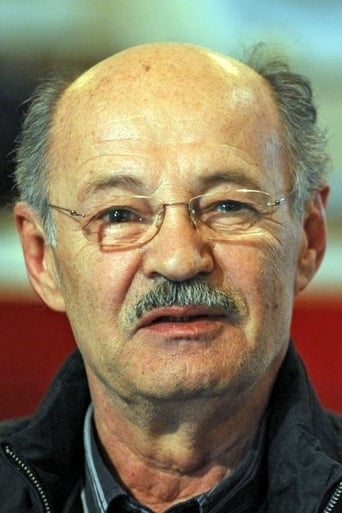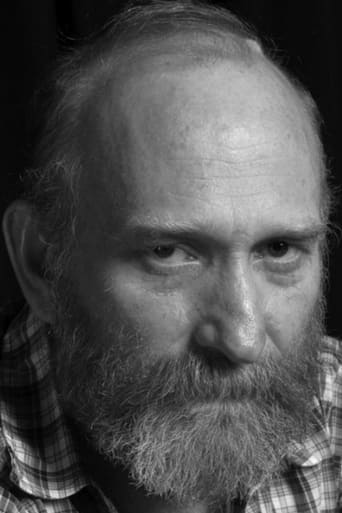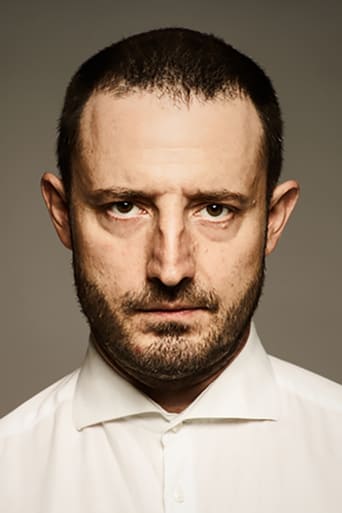Rijndri
Load of rubbish!!
Lollivan
It's the kind of movie you'll want to see a second time with someone who hasn't seen it yet, to remember what it was like to watch it for the first time.
Robert Joyner
The plot isn't so bad, but the pace of storytelling is too slow which makes people bored. Certain moments are so obvious and unnecessary for the main plot. I would've fast-forwarded those moments if it was an online streaming. The ending looks like implying a sequel, not sure if this movie will get one
Paynbob
It’s fine. It's literally the definition of a fine movie. You’ve seen it before, you know every beat and outcome before the characters even do. Only question is how much escapism you’re looking for.
KobusAdAstra
A Nietzsche aphorism at the beginning of the film gives a good indication what to expect in this sombre film: "Hope is the worst of evils, for it prolongs the torments of man".The backdrop of this film is the Macedonian town of Veles, still recovering from the ravages of civil war. Peacekeeping soldiers and armoured vehicles are very visible. Marko is not a happy lad. His father is a drunkard and spends more time with his buddies drinking and playing bingo than at home, his slutty sister is a vicious bully, while his mother is intimidated into silence by her patriarchal husband and abusive daughter. And this is not the end of Marko's problems; at school he is is bullied by fellow students, some from influential families. The only one on his side seems to be his Macedonian language teacher, who, incidentally, originates from Bosnia. He encourages Marko, a smart lad, to take part in a poem- writing competition, the first prize being a trip to Paris. Marko does not waste time, and starts straight away. Conditions at home are just not conducive for creative writing, and after some unpleasant domestic violence, he starts spending time in an old carriage in a train graveyard close to home. One day on his way home from school, Marko once again gets physically assaulted by the bullying thugs from his class, when his language teacher, who Marko thought was on his side, came cycling up, saw what was happening, turned around and quickly cycled away. One can't blame Marko for feeling very alone with nobody on his side. Then one day he meets a drifter, ironically called Paris, who also moves into Marko's disused train carriage. Paris would teach Marko to stand up for himself, and look after his own interests, even if it means stealing. Eat or be eaten, he says. Under the influence of his new buddy, Paris, Marko becomes more rebellious and even has a few scrapes with the law. It looks like Marko's life, once promising, is now going in totally the wrong direction…This tense, tragic drama to a large extent shares themes with 'Joe, the King' (1999), Luis Buñuel's outstanding 'Los Olvidados' (aka 'The Young and the Damned') (1950), and the superb 'The 400 Blows' (aka 'Les Quatre Cents Coups') (1959) by François Truffaut, and compares quite well with them. Although I must add, the latter two films are in a class of their own. I have been impressed by the imaginative cinematography displayed in'Mirage', whilst the character of the young protagonist was made believable through the true to life performance of Marko Kovacevic. The set is excellent too, with Veles, the smallish Macedonian town, as backdrop. I gladly recommend this film. 8/10.
khp101
One of the most amazing films I have ever seen in my life. I have not been so in tune with a film in a very long time. Every aspect of this film screams 'well-done.' The movie pulsates, after the train scene its just spectacular. Marko Kovacevic is sensational, he deserved to be recognized for a youth acting award. He is simply amazing on screen and not since young Christian Bale in Empire of the Sun, have we seen such a genuine, in your face work of cinematic genius.Stunningly done, the cinematography is professional and tangible. The on screen chemistry between all characters is very well directed. kudos to Macedonia.
nycritic
No one can call Nietzche from being someone who spawned cheerful, optimistic blurbs about the condition of Man and His position in the Universe. So the moment a film decides to use one of his more depressing quotes -- "Hope is the worst of evils, for it prolongs the torment of man." -- it was clear to me that this was not going to be a walk in the park, but an express ride into hell with no way back up.Macedonia produces this cinematic denouncement of a film and while it's too negative to be recommended, it's not a film anyone can ignore, or watch without feeling something wrenching at the stomach. The story of Marko, the little boy who lives in a country ravaged by civil unrest and the threat of a civil war just seconds away from happening, makes for an important voice even when the writers have given him none.Marko is in the middle of the death of his family as a unit. His father is a deadbeat drunk who plays the lotto and hopes to win. His mother moves about in a haze and his sister gives him an excruciating amount of abuse for the hell of it. School is no better: there is Levi, the school thug who leads a gang, who has decided to focus his anger on him. And a teacher, originally from Bosnia (considered sacrilegious of in this country) who sees hope in Marko's sensitive writing and thinks his poetry might be the express way out of this hell, into the promise of Paris.Paris indeed arrives, in a moment of hope, as a young mercenary of sorts -- a man who has lived a dangerous life. As Marko retreats from his daily dose of abuse into an abandoned train, he meets and befriends this man who comes to teach Marko two things: that life is hopeless and a constant battle, and to eat or be eaten (the movie's tagline). As the mental and physical violence around and directed at Marko escalates and even those who had hope in him decide to turn the other face as the ones in power (Levi and his police father) gain so much control that it seems all roads of escape end at their feet, Marko takes a drastic action into his own hands.This kind of story is not new. I think the director is trying to, in telling a story of the loss of hope, an allegory about how innocence -- the future (Marko) -- can take so much before crying out and lashing at those who try to help but cannot (Marko's teacher, who didn't even assist him when Levi and his gang beat him up at his doorstep but fled the scene). I did wonder if the introduction of Paris and Marko's transformation from golden haired boy into a killing machine was a foreshadowing of what Marko would become -- since he walks away from it all right at the end while no one even flinches to see what took place. Paris, the soldier, has told Marko not to expect anything from anyone, that the only way of leaving a bad situation is leaving, not hoping, and this is exactly what Marko in the end is implied as doing.MIRAGE is not an easy movie. At times I felt, as an American used to some form of catharsis that would in one way rescue the abused character and give him the victory over evil, that this systematic abuse was too much. It set me up for a false sense of "hope" once Marko starts taking subtle control over his life and even put down his sister in one funny scene. The only thing I can infer is that MIRAGE reflects the reality of many victims of society who have no one to help them, who have been pushed so far and then beyond the edge until they embrace the darkness of life. I kept getting slight references to a Mexican film by Luis Bunuel -- LOS OLVIDADOS in which innocence was also stolen and turned into something ugly. MIRAGE, however its pessimism (which is hard to take), has its beauty, even when it's one which should approached to with caution.
JohnnyLarocque
MIRAGE (Iluzija), is a Macedonian film from first time director Svetozar Ristovski, about a boy who is bullied at school, neglected and emotionally abused at home, and without a friend in the world. His teacher gives him hope by encouraging his writing, but eventually he is pushed to the brink. I knew I was going to enjoy this movie immediately as it opened with one of my favorite quote from Nietzsche: "Hope is the worst of evils, for it prolongs the torments of man." The movie is about how children can endure physical violence, but not false hope.The director uses some clever metaphors in the film. Although trains constantly pass through the sleepy Macedonian village, they never stop there. Marko, the child star of the film, seeks refuge in a train graveyard, living in an abandoned train car that will never go anywhere.There is nothing new about the story, as it's been told time and again in many different languages. What makes it worth watching is an honest look at Macedonian life, it's struggle with poverty and American occupation. But what really made the film for me was a phenomenal performance by 12 year old Marko Kovacevic as Marko. He blew me away. I had the chance to meet the young talent after the film, and he's as cool as he is shy. I would certainly recommend seeing this film for his performance alone. (8/10)



